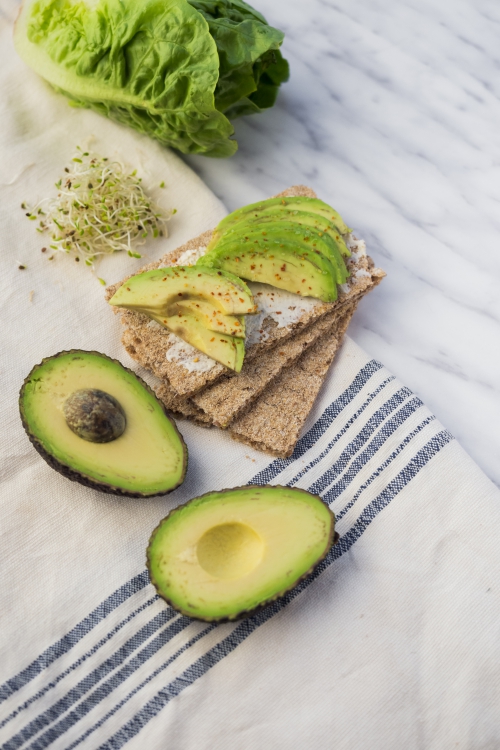Avocado is a tropical as well as subtropical fruit native to Central America and Mexico. Recently it is gaining enhancing acceptance (worldwide) due to its profound nutritional benefits on human health.
Nutritional profile
- It contains very less amount of carbohydrates hence considered as low glycemic food
- It is significantly rich in fibre
- It contains too some extent of protein as well
- It contains healthy fat. It is mainly rich in mono and poly unsaturated fatty acid and does not contain any cholesterol
- It contains several micronutrients like Vitamin A, Vitamin C, Vitamin E, Vitamin K, Vitamin B1, B2, B3, B5, B6, B9, potassium, sodium, magnesium, manganese, iron, phosphorus, zinc, calcium and copper
- It contains various bioactive compounds as well, which include phytosterol, campesterol, stigmasterol, beta-sitosterol, phenolic acid, tannin and flavonoids
Avocado oil
- Avocado oil is one of the most nutritious oil, extracted from avocado pulp
- It is edible oil and should be consumed by everyone as it has profound health benefits
- It contains monounsaturated fatty acid, polyunsaturated fatty acid and intermediate of saturated fatty acid
- It is considerably rich in oleic acid
- It also contains significant number of carotenoids, α-tocopherol, β-sitosterol and lutein
- It helps to inhibit hepatic and cerebral mitochondrial dysfunction, lipid peroxidation and oxidative stress (Nogueira-de-Almeida et al., 2018)
- It also helps to reduce the risk of developing chronic diseases

Avocado by products and their functional as well as nutritional properties
The whole fruit is tremendously nutritious and edible. The seed, pulp and peel of avocado are also extremely rich in bioactive compounds, which are accountable for exerting antioxidant, anti-carcinogenic, anti-inflammatory and antimicrobial activities. Various by products of avocado have prepared by focusing on appropriate utilization of its waste like pulp, seed etc and this monetization of waste has a great impact on environment as well as on the nutritional status of an individual (Araújo et al., 2018).
Individual who consumes avocado tend to be healthier
It has seen that individual, who consume avocado lives a better life than those who does not consume it. Consumption of avocado is very effective for decreasing the prevalence of metabolic syndrome, which is becoming a life-threatening health issue that greatly increases morbidity and mortality rate. People who regularly eat avocado generally have less BMI and tend to be slim.
Health benefits
Role on skeletal system
- Vitamin K and calcium contents of avocado significantly improve bone health
- It helps to increase bone mineral density
- Consumption of avocado is very helpful for reducing the risk of developing bone disorders
- Saponin components of avocado is incredibly helpful for improving the symptoms of osteoarthritis

Role on eye health
- Avocado is considered as the powerhouse of antioxidants
- It contains the most two important antioxidants required for promoting eye health, which include zeaxanthin and lutein, which are responsible for protecting the eye from oxidative damages and promotes vision
- It also helps to reduce the prevalence of cataract and macular degeneration
Role on weight management
- Avocado is such a food, which is rich in fibre and low in carbohydrate and this is the main reason accountable for making it able to prevent obesity
- It also provides a feeling of satiety hence helps to decrease total calorie consumption or food intake by restricting appetite
- Its fibre content plays significant role in enhancing the catabolic rate of the body, which is associated with increasing calorie expenditure thus facilitates weight reduction
Role on maternal health
- Consumption of avocado during pregnancy is extremely helpful for promoting the growth and development of fetus
- It helps to decreases the risk of miscarriages
- It has seen that proper consumption of avocado during gestation is very effective for lowering the prevalence of morning sickness
- Its folic acid content plays significant role in promoting the growth of fetus nervous system and inhibits the occurrence of neural tube defects and other congenital anomalies

Role on oral health
- Consumption of avocado is very beneficial for preventing bad mouth odour
- Its flavonoid components are responsible for inhibiting microbial growth within oral cavity and hence reduces the risk of developing oral infections
- It also helps to reduce tooth decay
Role on skin
- Consumption of avocado is very much advantageous for improving skin health
- Its carotene, fatty acid and lecithin contents are responsible for moisturizing the skin
- It also helps to enhance the elasticity of skin by stimulating collagen synthesis
- It helps to protect the skin from the harmful effects of UV radiation and reduces the prevalence of skin damages
Antimicrobial activities
- Polyphenolic compounds, tannins, flavones and catechin components of avocado play significant role in reducing the growth and reproduction of microbes within host as they show strong antimicrobial activities
- It is very effective against Escherichia coli
- Its consumption is very helpful for preventing food borne diseases
- It also helps to inhibit allergies

Role on detoxification
- It helps to stimulate the detoxification process of the body hence aids in inhibiting the accumulation of toxins within blood, which helps to make the body healthy
- Its fibre content is responsible for improving bowel movement, which plays important role in excreting toxins through bile and stool
Role on digestive health
- It contains both soluble and insoluble fibre, which play significant role in improving digestion
- Individual who suffers from constipation should consume avocado as it helps to promote regularity by making defecation easy
- It is associated with improving colonic motility hence reduces the risk of developing colonic pouch formation (diverticular disease) and colon cancers
- It also helps to protect the entire digestive tract from oxidative and inflammatory damages therefore decreases the risk of developing gastrointestinal diseases as well
Role on mental health
- Consumption of food rich in folic acid or Vitamin B9 is very much helpful for preventing depression, as folic acid helps to inhibit homocysteine accumulation.
- Avocado is a good source of folic acid hence its consumption is very effective for inhibiting depression and stress
- It also helps to improve mood by decreasing homocysteine level as it interferes with the synthesis of dopamine, serotonin and norepinephrine within body that are responsible for regulating sleep and mood

Therapeutic applications
- Its fibre, antioxidant and monounsaturated fatty acid contents make it heart friendly. Its consumption not only promotes cardiac functionality but also reduces the risk of heart attacks and strokes
- It also helps to decrease LDL, VLDL and triglyceride concentration in blood that helps to reduce the prevalence of atherosclerosis
- Its potassium content is extremely helpful for reducing blood pressure
- It also helps to improve fertility and enhances the success of in vitro fertilization (IVF) as well
- Its anti-inflammatory property and omega 3 fatty acid contents help to lubricate joints and thus aids in relieving joint pain
- It is also used for decreasing the susceptibility of developing renal disorders
General consideration of using avocado
- It can be consumed raw or can also be consumed with salads or any other recipes
- Basically, it has a rich, creamy, fatty texture and can easily blend with any other ingredients
- Inclusion of avocado in diet is really very beneficial

Source:
Araújo, R.G., Rodriguez-Jasso, R.M., Ruiz, H.A., Pintado, M.M.E. and Aguilar, C.N., 2018. Avocado by-products: Nutritional and functional properties. Trends in Food Science & Technology, 80, pp.51-60.
Bhuyan, D.J., Alsherbiny, M.A., Perera, S., Low, M., Basu, A., Devi, O.A., Barooah, M.S., Li, C.G. and Papoutsis, K., 2019. The odyssey of bioactive compounds in avocado (Persea americana) and their health benefits. Antioxidants, 8(10), p.426.
Duarte, P.F., Chaves, M.A., Borges, C.D. and Mendonça, C.R.B., 2016. Avocado: characteristics, health benefits and uses. Ciência Rural, 46(4), pp.747-754.
Ford, N.A. and Liu, A.G., 2020. The Forgotten Fruit: A Case for Consuming Avocado Within the Traditional Mediterranean Diet. Frontiers in nutrition, 7.
Nogueira-de-Almeida, C.A., Ued, F.D.V., de Almeida, C.C.J.N., Almeida, A.C.F., del Ciampo, L.A., Ferraz, I.S., Silva, L.D.O., Zambom, C.R. and de Oliveira, A.F., 2018. Nutritional profile and benefits of avocado oil (Persea americana): an integrative review. Brazilian Journal of Food Technology, 21.
O’Brien, C., Hiti-Bandaralage, J.C., Hayward, A. and Mitter, N., 2018. Avocado (Persea americana Mill.). In Step Wise Protocols for Somatic Embryogenesis of Important Woody Plants (pp. 305-328). Springer, Cham
Park, E., Edirisinghe, I. and Burton-Freeman, B., 2018. Avocado fruit on postprandial markers of cardio-metabolic risk: A randomized controlled dose response trial in overweight and obese men and women. Nutrients, 10(9), p.1287.











